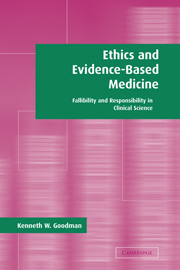Book contents
- Frontmatter
- Contents
- Preface
- Acknowledgments
- 1 Foundations and history of evidence-based practice
- 2 The research synthesis revolution
- 3 Evidence of evidence, and other conceptual challenges
- 4 Human subjects, the Internet, databases, and data mining
- 5 Evidence at the bedside
- 6 Public health policy, Uncertainty, and genetics
- 7 Ethics and evidence
- References
- Index
3 - Evidence of evidence, and other conceptual challenges
Published online by Cambridge University Press: 29 September 2009
- Frontmatter
- Contents
- Preface
- Acknowledgments
- 1 Foundations and history of evidence-based practice
- 2 The research synthesis revolution
- 3 Evidence of evidence, and other conceptual challenges
- 4 Human subjects, the Internet, databases, and data mining
- 5 Evidence at the bedside
- 6 Public health policy, Uncertainty, and genetics
- 7 Ethics and evidence
- References
- Index
Summary
I have little patience with scientists who take a board of wood, look for its thinnest part and drill a great number of holes where drilling is easy.
Albert EinsteinIn less than a quarter-century, efforts to combine or amalgamate the results of diverse research projects have become ubiquitous. Meta-analysis, for instance, has found employment in psychology and psychotherapy, social science, education, meteorology, marketing, management and business studies, and, perhaps especially, in medicine and epidemiology, including genetics and all aspects of clinical trials, drug efficacy, disease prevention, investigator education and reporting, public health, health policy, and patient education and behavior. This chapter addresses the notion of “meta-evidence” by looking at its relation to causation and rational clinical belief. Research synthesis and systematic science raise vitally important methodological and conceptual questions and so the chapter will also identify key methodological controversies and criticisms provoked by meta-analysis and other systematic reviews. What kind of scientific evidence is a meta-analysis or a systematic review, and how best should these tools be incorporated in research and clinical practice?
Evidence
Evidence is information that we use in deciding whether to believe a statement or proposition. It bears on the truth of our beliefs. A proposition might very well be true, but if there is no evidence that points in that direction, then there is no reason to believe it to be true.
- Type
- Chapter
- Information
- Ethics and Evidence-Based MedicineFallibility and Responsibility in Clinical Science, pp. 41 - 66Publisher: Cambridge University PressPrint publication year: 2002



